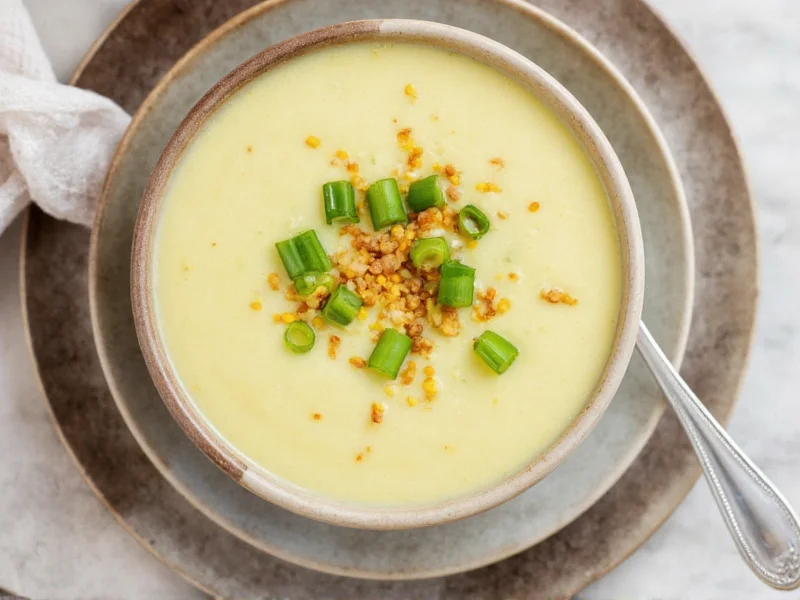The classic potato leek soup recipe combines 4 medium potatoes, 3 leeks (white and light green parts), 4 cups vegetable broth, 2 cloves garlic, 2 tbsp butter, salt, and pepper. Sauté leeks and garlic in butter until soft, add potatoes and broth, simmer 20-25 minutes until tender, then blend until smooth. This creamy, comforting soup serves 4 and takes 45 minutes total. For best results, clean leeks thoroughly and avoid overcooking potatoes to prevent graininess.
Nothing says comfort food quite like a steaming bowl of homemade potato leek soup. This French bistro classic, known as potage parmentier, has nourished generations with its simple elegance and versatile nature. Unlike many online recipes that cut corners or add unnecessary ingredients, this authentic version delivers the perfect balance of earthy potatoes and sweet leeks without relying on heavy cream.
The Secret to Perfect Potato Leek Soup
What separates an ordinary potato leek soup from an extraordinary one? The answer lies in three critical elements: proper leek preparation, potato selection, and cooking technique. Many home cooks make the mistake of using the entire leek, including the tough dark green parts, which impart bitterness. Others over-rely on dairy, masking the delicate flavors that make this soup special.
Essential Ingredients Explained
Understanding each component ensures your easy homemade potato leek soup turns out perfectly every time:
| Ingredient | Why It Matters | Pro Tip |
|---|---|---|
| Leeks (white/light green) | Provides sweet, onion-like flavor without sharpness | Soak sliced leeks in water to remove hidden dirt |
| Yukon Gold potatoes | Naturally creamy texture without added dairy | Peel only if skin is thick or waxed |
| Homemade vegetable broth | Creates cleaner flavor profile than store-bought | Add a parmesan rind while simmering for depth |
| Butter (not oil) | Enhances flavor absorption of aromatics | Use unsalted to control sodium levels |
Step-by-Step Preparation Guide
Follow these detailed instructions for the best potato leek soup recipe for beginners that yields restaurant-quality results:
- Prepare leeks: Trim roots and dark green tops. Slice white/light green parts thinly, then rinse thoroughly in a bowl of cold water to remove grit.
- Sweat aromatics: Melt butter over medium-low heat. Add leeks and garlic with pinch of salt. Cook 8-10 minutes until softened but not browned.
- Add potatoes: Stir in peeled and diced potatoes, coating them in the leek mixture. Cook 2 minutes to enhance flavor.
- Simmer soup: Pour in broth, ensuring potatoes are fully submerged. Bring to gentle boil, then reduce heat and simmer 20-25 minutes until potatoes pierce easily with fork.
- Blend carefully: Use immersion blender directly in pot until smooth. For traditional texture, blend only half the soup and leave some potato chunks.
- Season properly: Add salt and white pepper to taste. Remember: seasoning after cooking prevents potatoes from becoming waterlogged.
Avoiding Common Potato Leek Soup Mistakes
Even experienced cooks make these errors when preparing creamy potato leek soup without cream:
- Skipping the sweat step: Rushing the leek cooking creates sharp, raw onion flavor instead of sweet foundation
- Using wrong potatoes: Russets create grainy texture; waxy potatoes don't break down properly
- Over-blending: Creates gluey consistency rather than velvety texture
- Adding dairy too early: Causes curdling and masks delicate flavors
- Under-seasoning: Potatoes require more salt than expected to shine
Delicious Variations for Every Diet
This vegetarian potato leek soup recipe adapts beautifully to various dietary needs while maintaining its essential character:
- Vegan version: Substitute butter with olive oil and add 1 tbsp nutritional yeast for umami depth
- Gluten-free: Naturally compliant - just verify broth ingredients
- Lightened version: Replace half the potatoes with cauliflower for lower carb option
- Gourmet upgrade: Finish with truffle oil and chives for special occasions
- Protein boost: Stir in shredded chicken or white beans after blending
Serving and Storage Tips
Maximize your traditional French potato leek soup experience with these professional recommendations:
- Serving temperature: Serve piping hot but not boiling - 165°F (74°C) preserves delicate flavors
- Garnish wisely: Crispy leek strings, fresh thyme, or a swirl of crème fraîche enhance without overwhelming
- Perfect pairings: Serve with crusty bread and simple green salad for complete meal
- Storage: Keeps refrigerated for 4 days or frozen up to 3 months in airtight containers
- Reheating: Warm gently over medium-low heat, adding splash of broth if too thick
Why This Recipe Stands Out
Unlike many potato leek soup recipe with step by step instructions found online, this version respects the dish's French heritage while accommodating modern kitchens. The technique focuses on developing flavor through proper cooking methods rather than masking imperfections with excessive cream or bacon. By understanding the science behind potato varieties and leek preparation, you'll create a soup that's simultaneously rustic and refined - perfect for weeknight dinners or impressing guests.











 浙公网安备
33010002000092号
浙公网安备
33010002000092号 浙B2-20120091-4
浙B2-20120091-4